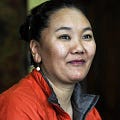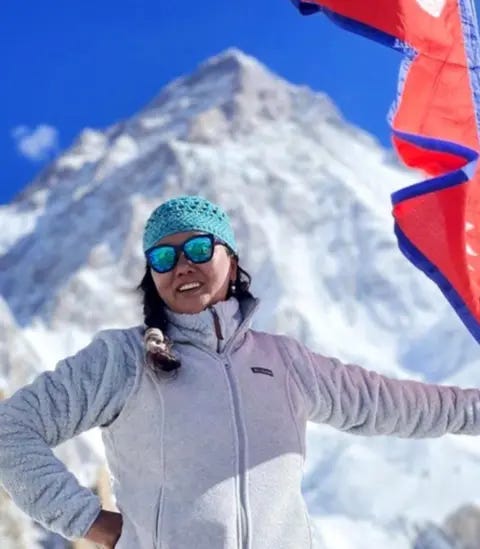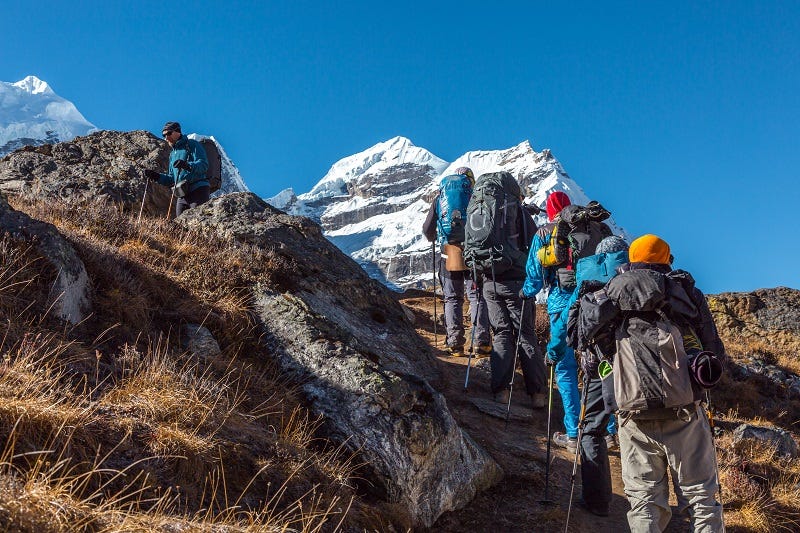© Getty Images
It’s another steamy morning in Milan. I woke early and after a stressful week, came across a truly inspiring story that renews hope in my own agency and ability to manifest a life worth living in a world that is anything but regenerative.
Lhakpa Sherpa is an extraordinary woman. She has climbed Everest no less than 10 times, cannot read and now works in a grocery store and as a cleaner to support her family in the US, after escaping from a dire situation of domestic violence.
A woman, the world's highest mountain and astonishing mastery
Born in the 1970s to yak farmers in the Nepalese Himalayas, she was one of 11 children. She carried her brother to school through the mountains but was not allowed inside. Her lack of early education means that she is still unable to read. By the time she was 15, she was working as a porter on mountain expeditions. This work enabled her to avoid a traditional arranged marriage.
After a brief relationship in Kathmandu however, she found herself pregnant and too ashamed to return home as an unmarried mother. Still climbing when possible, she fell in love with a Romanian-US mountaineer with a dramatic story of his own. He had escaped the Romanian dictatorship by swimming across the Danube. He had already begun a new life in the US and they married and moved to Connecticut, where they had two daughters with wonderful names - Sunny and Shiny.
Things soured quickly sadly, because the Romanian became violent. The situation became evident to others during a descent from Everest in 2004 in bad weather. Lhakpa was photographed unconscious and dragged by her husband from their tent, as he yelled at people to ‘get this garbage out of here’.
© Netflix
The story of Lhakpa’s life, both on and off the mountain, has been made into a Netflix documentary. She is proud of the film and wants to show that women can also do it. Her limited training for climbing the world’s highest mountain is astonishing. She keeps fit in the mountains of Connecticut and says that she is very good at altitude, much less so with education.
Lhakpa finally left her abusive husband in 2012 when he put her in hospital again. She moved to a women’s refuge with the help of a social worker and in 2016, divorced him and was awarded sole custody of their daughters. The Romanian received only a suspended sentence and a year of probation after a breach of the peace. The court could not convict him of second-degree assault as their documents showed no evidence of a visible head injury. He died of cancer in 2020.
Not surprisingly, it has been traumatic for Lhakpa and her family to share the details of their personal and private lives. But as she says, ‘Hurt woman is very tough. Does not give up easily. I keep doing.’ Climbing is both her passion and very healing. She leaves her darkness on the mountain. Like so many (Asian) immigrants, she has given everything to being able to provide a better life for her children, in particular to give them an education.
Lhakpa wants to earn her living with her own guiding company and find more sponsorship. If anyone in my network can help, please get in touch with The Guardian or Lucy Walker, director of the Netflix documentary ‘Mountain Queen: The Summits of Lhakpa Sherpa’, which will be showing on the channel on 31 July.
Most of us will never be Sherpas but are often climbing our own mountains. Bumpy times are up ahead, we have had a taste of them in recent years, and the next ones are unlikely to get any easier. Watching the Olympics ceremony last night along with millions of others, I was struck by the huge contradictions in the words and actions - a spectacular Eurotrash show for the glory of Paris, while the athletes sleep on cardboard beds, have to eat crappy food by all accounts and risked getting flu in the driving rain while frantically waving their national flags. Solidarity and care for all peoples at the heart of Olympic values in a global business that demands intense sacrifice and elite athletic performance in order to win through defeating others, not always through honest means. My grandmother took part in the 1936 Olympics in Berlin. I couldn’t help but draw parallels.
I particularly appreciate Lhakpa Sherpa’s description of how climbing Everest (and other mountains) are a deep healing process. It’s true - life’s ‘mountains’, real or proverbial, help to shape and form us, require us to be humble, prepared and highly adaptive, sometimes to completely let go of all the ideas and plans that we had about how to conquer them. I’m married to a mountaineer who has ascended many peaks of his own. I can’t easily make it to 3000m these days but with the necessity of life changes in the coming months, we might be dedicating more time and energy to hiking once more. In areas without bears.
Green shoots often grow in unlikely places. I saw a few out walking the other day. Pretty little flowers blooming out of dirty old walls. Fat fish swimming and feeding in mucky waters at the edge of the lake. We returning to our car exhausted and detoxed after hours in the burning sun.
I help leaders and their teams sow, find and nourish the green shoots that are possible, even in a context of decline and loss. To create conditions that are conducive to life.
If you would like to find out more, please look at my website, watch or listen to our podcast
, where we talk about regenerative leadership and organisational development.Thanks for reading.





